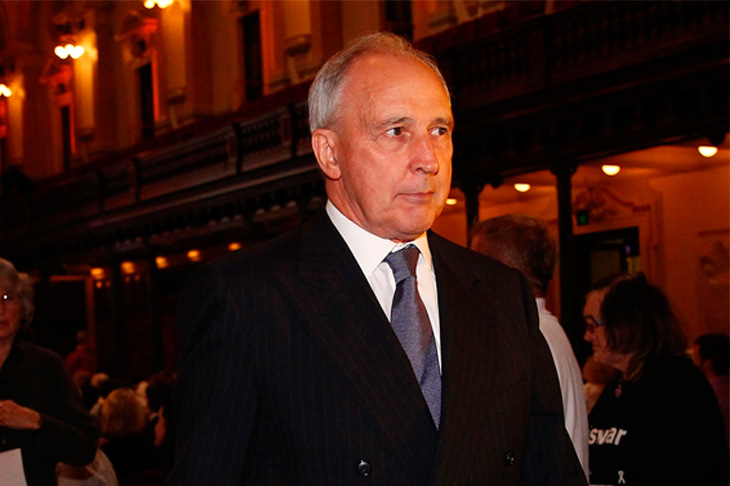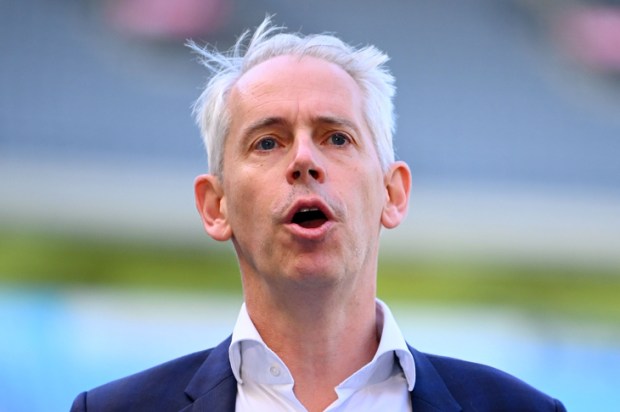Paul Keating‘s obsession with turning us into some politicians’ republic is not about improving the governance of Australia, surely the only proper reason for constitutional change. As with the 1999 Keating-Turnbull republic, it’s all about giving the political class even greater power and influence. This explains why Australia’s republican elites won’t have a bar of the world’s oldest and most successful republics, the American and the Swiss. Keating instead seems to be turning to Beijing for some Marxist model.
Were we to lose our constitutional monarchy — a circumstance I cannot foresee and would strongly oppose — the obvious solution would be to look to the USA and Switzerland just as our founders did. Any such model would have to be mitigated by increased democratic control over activist judges and to ensure the better accountability of the politicians. But we could do both now without abandoning the Westminster system and the crucial role of the Australian Crown in that. And notwithstanding the many excellent features of the American constitution, whenever it has been exported it has not worked well for long, unlike the British model.
Keating has once again demonstrated his propensity to be highly selective in argument. In claiming Prince Charles’ support, he quotes only one part of a 1994 speech. And why, when he rails against our so-called ‘borrowed’ monarchy, does he borrow the London press to initiate his case? Only quoting the Prince’s summary of the republican case, he ignores both his summary of the counter-argument and this firm and balanced conclusion: ‘The point I want to make here, and for everyone to be perfectly clear about, is that this is something which only you – the Australian people – can decide.’
Keating also relies on the one pathetic argument republicans now make for this massive change – the palpably false one that only in a politicians’ republic can we have an Australian as head of state. For heaven’s sake, hasn’t Keating bothered to read the several editions of his own government’s official directory which state unequivocally that the governor-general is the head of state?
In support of this ‘narrative’ (that’s Marxist gibberish for a conclusion whatever the facts), Keating constantly attacks our Australian flag which he says, ‘gets up his nose’, a problem any good otolaryngologist could solve rather than endlessly boring the public.
All this may well be explained by his unhealthy and almost pathological hatred of the British, unlike most other Labor leaders. For example, when the UK was under immediate threat of a Nazi invasion, Foreign Minister Dr H. V. Evatt broadcast a message to the British people, ending with this poem:
And we shall say to all the world that kinship conquers space,
And he who fights the British Isles must fight the British race.
In contrast, during Question Time in Parliament on 27 February 1992, Keating gratuitously accused Britain, a close ally, of abandoning Australia to the Japanese during the Second World War. This is a complete misrepresentation of Britain’s continuing role in the war in Asia after Singapore, in particular on the high seas, and in the Indian and Burmese campaigns. How else can Keating explain the fact that the Supreme Allied Command in South-East Asia was vested in Lord Mountbatten alongside General Eisenhower in Europe and General MacArthur in the South-West Pacific?
In the meantime, Keating has told us about the republican model he admires. He says that the Chinese Communist government ‘has been the best government in the world in the last thirty years’. Really? The best government in the world?
He calls on us to stop being a ‘client state’ of the Americans (that’s a slightly less insulting way of saying we’re a US satellite as communist Bulgaria was to the Soviet Union). He wants us to adopt an ‘independent’ foreign policy, no doubt one the Beijing government would approve.
In his recent book, Silent Invasion, Clive Hamilton says Keating thinks he knows everything about China because he talks to the top leadership. Hamilton says that an old China hand greeted Keating’s belief with a wry grin: as if the communist leaders would confide their inner thoughts and plans to a foreigner. Pointing out that Keating chairs the International Advisory Council of the China Development Bank, he says while this ostensibly provides strategic guidance, it mainly provides the bank with ‘well-paid champions’.
So is Keating’s plan to replace our Federal Commonwealth with a version of the Chinese People’s Republic whose government he so admires?
Keating’s conversation with London journalists created a frisson among the republican commentariat here. Then on 3 April the Sydney Morning Herald ran a front page report on the latest Australian Electoral Study from the ANU. This showed voters from the Left increasing to over 30 per cent with the right staying around 27 per cent.
I have long thought that the problem with the AES is that it requires respondents to fill out a lengthy questionnaire. I frankly cannot see such people as farmers and small business people doing this. I think this inadvertently skews the responses.
In any event, in 1999 the AES found almost 20 per cent more republicans than those who actually voted Yes in the referendum. I don’t believe these were direct- elect republicans totally opposed to the Keating-Turnbull model; voting for the convention election supports nothing like this. In some years, at least, the questionnaire adopted the republican position on the head of state, just as the Essential poll does. They shouldn’t.
The AES says support for a republic is now 53 per cent. This means that if the 1999 referendum were run today the Yes vote would fall to 33 per cent. My considered conclusion is that support for a vague undefined politicians’ republic is now in the 30-40 percentile range. Once the model is revealed and arguments heard this must fall considerably. No wonder Shorten and Turnbull are talking about those fake referendums, plebiscites. Don’t they realise the nation has moved on since 1999?
Got something to add? Join the discussion and comment below.
Get 10 issues for just $10
Subscribe to The Spectator Australia today for the next 10 magazine issues, plus full online access, for just $10.
You might disagree with half of it, but you’ll enjoy reading all of it. Try your first month for free, then just $2 a week for the remainder of your first year.














Comments
Don't miss out
Join the conversation with other Spectator Australia readers. Subscribe to leave a comment.
SUBSCRIBEAlready a subscriber? Log in